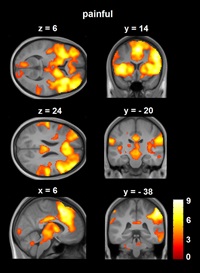Altered Pain Processing After Opioid Discontinuation
 An imaging study of the brain and spinal cord published in JNeurosci reveals pain processing changes in healthy men after receiving a short-term application of a strong opioid. The research provides a plausible mechanism underlying increased pain sensitivity after discontinuation of opioid medication.
An imaging study of the brain and spinal cord published in JNeurosci reveals pain processing changes in healthy men after receiving a short-term application of a strong opioid. The research provides a plausible mechanism underlying increased pain sensitivity after discontinuation of opioid medication.
Opioids are known to inhibit pain, but it is increasingly recognized that they can also increase sensitivity to pain in certain situations. Dr. Sprenger and colleagues investigated changes in the brain and the spinal cord after application of the potent opioid remifentanil corresponding to increased sensitivity to heat pain stimuli applied to the forearm of healthy male adults. Functional magnetic resonance imaging found altered signaling in a network that connects frontal brain regions via the brainstem with the spinal cord that has a crucial role in regulating pain. Since remifentanil has a very short half-life and was mostly cleared from the blood when the changes occurred, these results cannot be attributed to direct effects of the drug. Instead, they indicate altered pain processing in the central nervous system subsequent to opioid application.
Article: Altered signaling in the descending pain modulatory system after short-term infusion of the μ-opioid agonist remifentanil
Corresponding author: Christian Sprenger (University-Medical-Center Hamburg-Eppendorf, Germany), c.sprenger@uke.de or cs910@cam.ac.uk
Phone: +49-(0)40-7410-27302




















